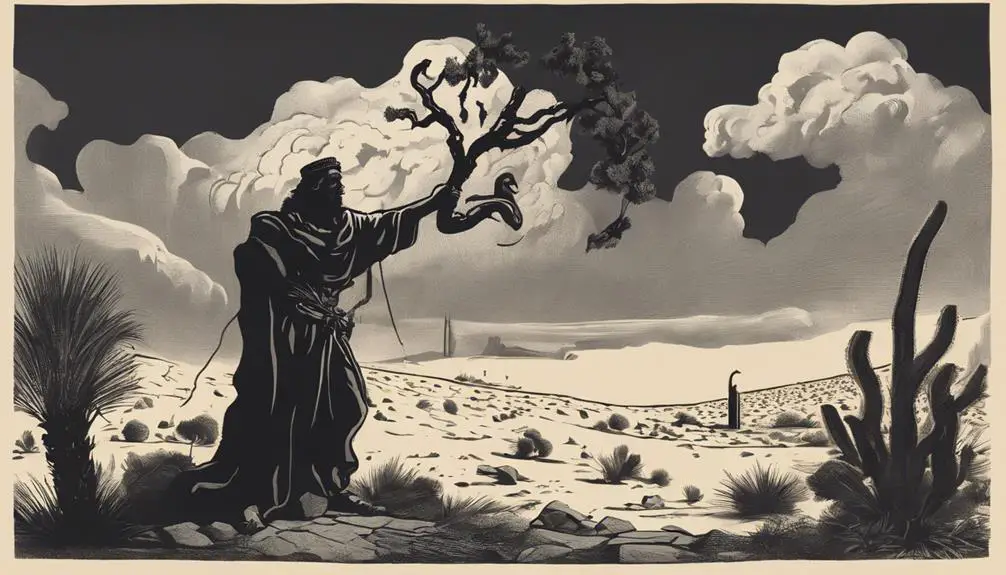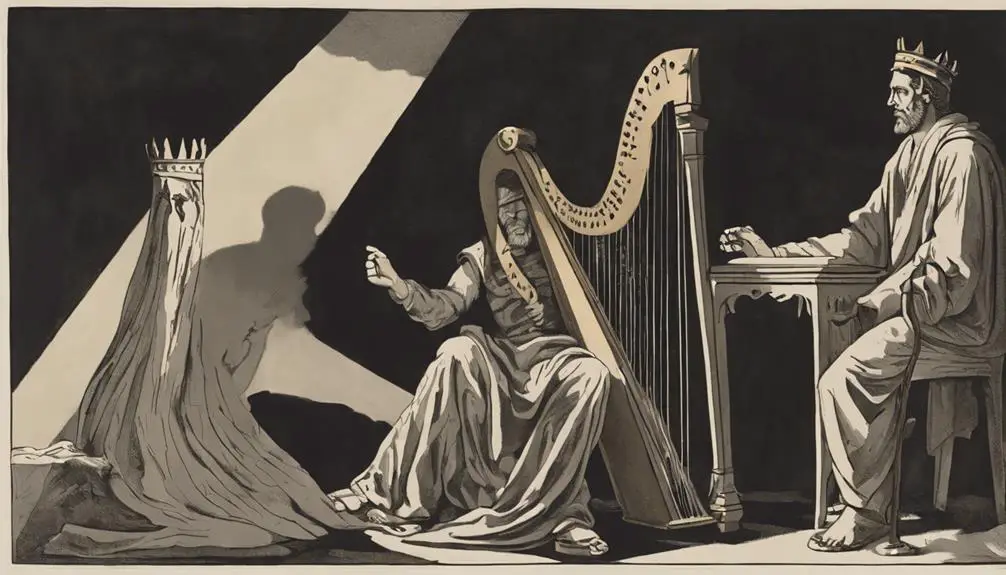Missteps of paternal figures in the Bible reveal striking lessons; delve into their flawed journeys and uncover what led them astray.

Bad Fathers in the Bible
In your journey through the Bible, you've likely encountered more than a few paternal figures who've fallen short of the mark. From the negligence of Eli to the disturbing choices of Lot, the scripture doesn't shy away from showcasing the flawed side of fatherhood.
As you explore these stories, you might find yourself questioning how such figures could be so misguided. What lessons can we glean from these accounts? Their mistakes are not without purpose; they serve as illuminating examples of what not to do.
But, why did these men falter so drastically? Ponder that.
Key Takeaways
- The Bible highlights severe consequences of fathers' neglectful parenting, as seen in the stories of Eli, Lot, David, and Saul.
- Abuse of power within families, such as in Eli's and David's households, can lead to significant family instability and tragedy.
- Fathers' moral failings, including passive response to sacrilege and paranoia, can deeply impact their families and society.
- The Bible presents long-term consequences of poor leadership, emphasizing the importance of responsible fatherhood and its influence on future generations.
Eli: The Negligent Priest

Delving into the narrative of Eli, the negligent priest, you'll uncover a tragic tale of parental failure in the sacred texts of the Bible. Eli's position of power as a priest wasn't enough to shield him from the consequences of his actions, or rather his inactions, thus painting a stark picture of priestly negligence.
Eli's failures lie primarily in his inability to reprimand and control his unruly sons, Hophni and Phinehas. They exploited their inherited positions for personal gain, showing blatant disregard for the sacred office they held. Alarmingly, Eli was aware of their sacrilege, yet he remained passive, a clear display of parental negligence.
You'll note how this lapse in judgment and responsibility led to dire consequences. Eli's family was cursed, his sons met unfortunate ends, and he himself perished in disgrace. His story serves as a chilling reminder of the devastating effects of negligence, especially when it stems from a figure as influential as a priest and a father.
In essence, the narrative of Eli underscores the importance of accountability in parenthood and spiritual leadership. It's a tale of caution, illustrating the dire consequences of failing to address misconduct, thereby emphasizing the significance of proactive guidance in both familial and ecclesiastical contexts.
Lot: A Father's Disturbing Choice
Turning our attention to Lot, another biblical figure marred by questionable fatherhood, a deeply unsettling choice he makes casts a long, troubling shadow over his character. This father's disturbing choice, spotlighted in the story of Sodom and Gomorrah, is where we'll focus our analysis.
- Lot's Morality: Despite being regarded as 'righteous' earlier in Genesis, Lot's decision to offer his virgin daughters to a lecherous crowd in order to protect his guests raises serious questions about his moral compass. It's a stark contrast, suggesting a twisted sense of hospitality over familial duty.
- Incestuous Implications: Following Sodom's destruction, Lot's daughters intoxicate him and engage in sexual relationships to bear offspring. The Bible doesn't explicitly condemn Lot, yet it's hard to shake off the disturbing implications.
- Impact on Daughters: This scenario portrays Lot's daughters as victims of their father's decisions. They're reduced to mere commodities, their worth tied to their virginity and ability to bear children.
Lot's narrative isn't just a tale of a father's disturbing choice. It's also a reflection of societal norms of the time, where women were often devalued, their rights secondary to men's. It's a stark reminder of the need for progress towards gender equality.
David: A King's Parental Failures

Shifting our gaze from Lot's questionable decisions, we encounter another biblical figure, King David, whose parental failures serve as a stark reminder of the complexities and pitfalls of fatherhood in the ancient world. David's favoritism is a key component of his parental failings. He favored his son Absalom, which not only caused discord among his other children, but also fueled Absalom's rebellion.
Absalom's Rebellion, a significant event in biblical history, stemmed from David's failure to address the rape of Absalom's sister, Tamar. David's inaction in this matter pushed Absalom to take justice into his own hands, resulting in the murder of his half-brother, Amnon. This led to a further rift in the family dynamics.
This favoritism and lack of proper discipline contributed to a tumultuous father-son relationship that ended tragically. David's inability to foster a healthy family environment demonstrates the detrimental effects of parental favoritism and neglect. His story offers a sobering lesson about the importance of impartiality and proactive intervention in parenting. In this light, King David's reign was marked not only by his successes as a ruler but also by his failures as a father.
Saul: Insecurity and Jealousy

Plunging into the narrative of Saul, we find a father plagued by insecurity and jealousy, emotions that significantly impacted his relationship with his children. Saul's paranoia became a driving force in his life, leading him to make decisions that not only affected his rule as king but also his family dynamics.
- Insecurity: Saul's constant fear of being less than others led to an environment of mistrust. He was unable to celebrate the victories of his children, particularly Jonathan, as he saw them as threats to his rule.
- Jealousy: Saul's jealousy resulted in hostility towards David, who was like a son to him. This jealousy impacted his relationship with his own children, who loved David.
- Paranoia: Saul's paranoia caused him to alienate those around him, including his children. His actions were often erratic and unpredictable, leading to a strained and unstable family.
You see, the story of Saul is one of a father whose personal insecurities and jealousies overpowered his ability to love and support his children unconditionally. His story serves as a stark reminder of how personal struggles can seep into our relationships, altering the way we interact with those we care about.
Manasseh: The Idolatrous King

While Saul's tale warns us of the perils of insecurity and jealousy, we encounter another troubling example of fatherhood in the Bible with Manasseh, the idolatrous king. Known for his idolatry, Manasseh's destructive reign was marked by his blatant disregard for the God of his fathers. He constructed altars to Baal, worshipped heavenly bodies, and even placed an idol in God's temple.
The influence of idolatry during Manasseh's reign was profound and pervasive. It not only corrupted the spiritual integrity of the kingdom, but it also led to social and moral degradation. The Bible tells us that he led his people astray, causing them to do greater evil than the nations God had destroyed before the Israelites.
Yet, in his latter years, Manasseh experienced a transformative repentance. He tore down the altars he'd built and turned back to God. However, the damage inflicted during his earlier reign was irreversible, his influence had deeply embedded idolatry in the hearts of his people. Thus, Manasseh, the idolatrous king, serves as a stern reminder of the long-term consequences of poor spiritual leadership and the profound impact a father's actions can have on his children and society.
Frequently Asked Questions
What Were the Common Parenting Practices During Biblical Times?"
In biblical times, parenting practices were heavily rooted in discipline and ancient child-rearing methods. Parents were expected to train their children in moral, social, and religious codes. They used methods of correction like rebuke and occasionally physical discipline.
However, it's crucial to remember that these practices varied widely depending on the specific culture, time period, and personal beliefs of the parents.
How Do These Stories of Bad Fathers in the Bible Compare to the Portrayal of Good Fathers in the Scripture?"
In comparing stories of fatherhood in scripture, you'll find stark contrasts. Good fathers in the Bible often symbolize divine paternity, embodying guidance, protection, and wisdom. They're models of virtuous behavior, whereas bad fathers can represent human failings and moral lapses.
This comparison illustrates the wide spectrum of fatherhood symbolism in the Bible, serving as a mirror to understand divine and human characteristics.
Are There Any Psychological Theories or Studies That Can Help Explain the Behaviors of These Bad Fathers in the Bible?"
Certainly, psychological theories can provide insight. Jungian psychology discusses Paternal Archetypes, which can help explain some behaviors. Freud's Oedipus complex may also shed light on father-son dynamics. Studies on Fatherly Punishments can further our understanding of these biblical figures.
However, it's important to remember that these theories are contemporary, and may not fully capture the cultural and historical context of the Bible.
How Did Societal Norms and Expectations Influence the Actions of These Biblical Fathers?"
You're considering the impact of cultural influences and biblical patriarchy on societal norms. These factors greatly shaped behaviors, with societal expectations often dictating actions.
In a patriarchal society, men felt pressured to assert dominance, often resulting in harsh treatment of others. This isn't a justification but an explanation.
Understanding these societal norms provides insight into these actions, even if it doesn't excuse them.
What Impact Did the Actions of These Fathers Have on the Overall Narrative of the Bible?"
Consider the impact fatherly influence can have on a narrative. In the bible, these actions often had profound biblical consequences. They shaped the stories, influenced character development, and even altered the course of events.
It's not just about individual misdeeds, but how these actions ripple outwards, affecting the larger narrative. In essence, the repercussions of these paternal actions significantly impact the overall interpretation and lessons drawn from the Bible.
Conclusion
So, you've explored the stories of Eli, Lot, David, Saul, and Manasseh: fathers who made grave mistakes. These biblical narratives serve as hard lessons about paternal failure.
Whether it's Eli's negligence, Lot's unnerving choices, David's parental shortcomings, Saul's jealousy or Manasseh's idolatry, these stories remind you of the profound influence a father wields. They underscore the importance of nurturing, guidance, and moral responsibility that comes with parenthood.
Truly, fatherhood isn't for the faint of heart.



Sign up